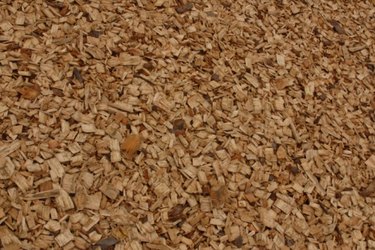Things You'll Need
Herbicide
Landscape fabric

Wood chips provide attractive mulching material for the home garden. A thick layer of chips inhibits the germination and growth of weeds -- and they also provide an insulating layer over the bed to protect plant roots from frost and retain moisture in the soil. Use wood chips in your garden, or take advantage of the weed-suppressing qualities to make natural-looking pathways.
Garden Beds
Step 1
Weed the garden bed thoroughly. Pull up all undesired plants so that the roots are removed.
Video of the Day
Step 2
Spread the wood chips over the soil's surface in the garden bed. Apply the chips to a depth of 3 inches.
Step 3
Pull the chips back from the stems and trunks of each plant, creating a 2-inch space between the wood and the plant. Wood chips that sit against plant stems retain moisture that causes the stems to rot.
Step 4
Replenish the wood chips each spring to maintain the 3-inch depth. The wood chips decompose slowly, requiring replacement. In addition, the decomposed wood chips add nutrients to the garden soil.
Video of the Day
Pathways
Step 1
Spray the pathway with an herbicide to kill weeds and grass. A glyphosate herbicide kills plants in the application zone, but does not remain active in the soil afterward.
Step 2
Dig a 3-inch-deep trench along either side of the path. Place the soil removed from the trench outside of the path area.
Step 3
Lay landscaping fabric over the path. Push the edges of the fabric into the trench on either side of the path, then replace the soil in the trench, anchoring the fabric in place. The fabric helps eliminate future weed growth, but still allows water to drain from the path.
Step 4
Fill the path area with a 4- to 6-inch layer of wood chips. Replace the wood chips every one to two years as they begin to degrade. Dispose of, or compost, the old wood chips.
Tip
Get wood chips for free or at a low cost from tree-removal companies. They often have a surplus of chip mulch from the trees they've cut down.